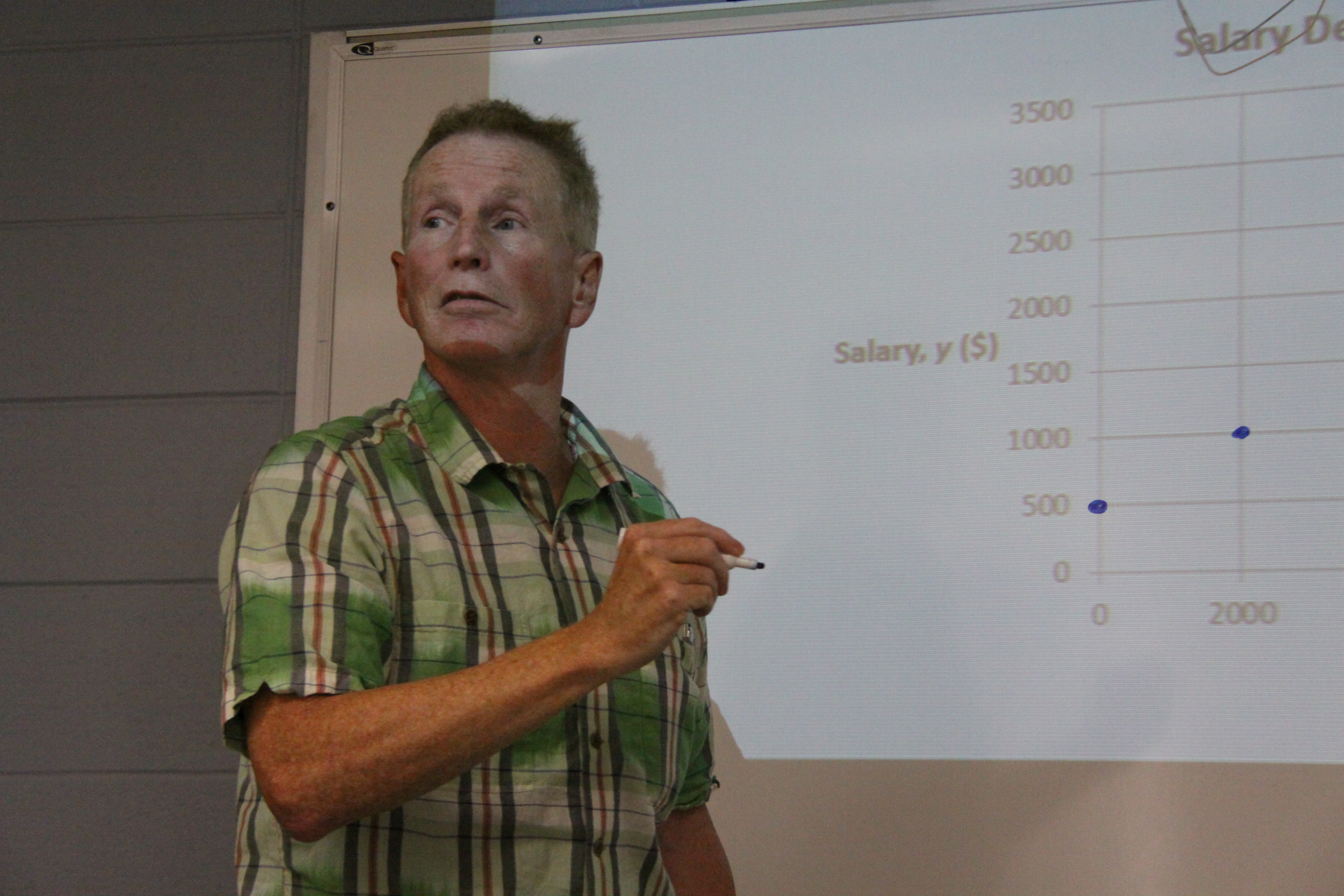
Jim Sullivan teaches a developmental math class at Northern Essex Community College (Kirk Carapezza/WGBH).
A few months ago, WGBH's Higher Education Desk decided to take a look at how Americans view community colleges. WGBH News commissioned a national poll that shows people think community colleges are a good value and provide upward mobility.
But the poll also show there's a feeling that community colleges are a good option for students with bad grades in high school - a perception backed by fact: More than half of all community college students do need to take developmental courses in math or English before starting their two-year degrees. So some schools are trying something different to prevent these students from dropping out.
It's 8:30 on Monday morning, and Bunker Hill Community College professor Richard Doherty is teaching his students the quadratic formula, preparing them for more advanced mathematics.
Few students seem engaged with Professor Doherty's Power Point. Some trickle in 30 minutes late; one student is watching highlights of Sunday’s Patriots game; others giggle in the back row and tap out messages on their smartphones.
Oscar Kakooza, though, sits in the middle of the classroom, trying to stay focused.
“The distractions with the cell-phones and stuff like that - at times it's two-ways: the professor is frustrated and they're also frustrated,” says Oscar. “So it's like 'Why the hell did I even sign up for this course? I don't understand.’"
Oscar says he wants to be a biomedical engineer. He got good grades in high school in Uganda, but he admits that he needs the extra support of this remedial class if he's going to succeed in America. Some things he already learned in high school, and he feels the repetition is slowing him down.
"The system here makes you do things that you already did," says Oscar.
Oscar isn't alone in feeling that he's spinning his wheels. Other students are feeling the same way.
The problem, experts say, is that developmental education replicates the curriculum that these students were exposed to in high school.
"And they didn’t do well with it in high school, so why would we expect for them to do well in it now?" asks Shanna Jaggars, who studies community colleges at Columbia University.
The result, Jaggars says, is that fewer than a third of the students who have to take developmental classes end up graduating within three years.
"If you have to take a couple semesters to get through developmental education, there's not a lot pulling you toward college,” she says. “But there are probably a lot of other external forces that are pulling you away from college."
External forces like jobs and family. Like many of his classmates, Oscar Kakooza has responsibilities outside of school. He works about 40 hours a week at McDonalds and Walmart, sending money to his family back home in Uganda, while he struggles to get through developmental education.
"It takes more time and then you pay for it and then at times you know the course material and at times you discover, ‘Oh it’s slowing me down’ but then you have to take it,” he says. “So that’s the negative side of it."

Bunker Hill Community College is one of the schools offering enrollment in developmental and college-level courses simultaneously (Kirk Carapezza/WGBH).
To make sure Oscar and other students don't get so discouraged that they drop out, Bunker Hill is piloting a number of developmental education programs. Students can simultaneously enroll in a college-level course and a developmental course. The latter serves as a kind of study group for the other, more difficult class.
At Northern Essex Community College in Haverhill, professor Jim Sullivan is taking a similar approach.
"This is the course they dread the most. So having success with them really means a lot to me," says Sullivan, who teaches remedial math.
"And that is one of my favorite things to teach, because I know the student gets into the college-level course but they feel supported by having this other course that kind of fills in the gaps that are missing," says Sullivan.
Columbia's Shanna Jaggars says these pilot programs are working.
"The results of people who are taking the college-level course with the support course are much, much better than if they try to take developmental education first and then are allowed to eventually take the college level course," says Jaggars.
And with extra support and tutoring, early numbers show more students like Oscar Kakooza stay in school and graduate.
"I've seen people achieve, I've seen people who have done many things from community college," says Oscar.
Many thinks that at one time seemed out of reach for community college students who feel stuck in remedial classes.
This is part four of our ongoing series on community colleges, "College Material." Throughout this week, we're exploring our poll results, meeting students and talking with educators. To see the rest of our stories, visit College Material: Community Colleges Come of Age.










